2010 July
About Andrew Cusack
 Writer, web designer, etc.; born in New York; educated in Argentina, Scotland, and South Africa; now based in London.
Writer, web designer, etc.; born in New York; educated in Argentina, Scotland, and South Africa; now based in London. read more
News
Blogs
Reviews & Periodicals
Arts & Design
World
France
Mitteleuropa
Knickerbockers
Argentina
The Levant
Africa
Cape of Good Hope
Netherlands
Scandinavia
Québec
India
Muscovy
Germany
Academica
Stellenbosch Scientists Invent Cheap & Easy Water Filtration for the Masses
Prof. Eugene Cloete and his colleagues at the Water Institute of the University of Stellenbosch have come up with a helpful solution to the problem of drinking water in developing countries. The professor invented an inexpensive, teabag-like sac of nano-fibres — each about one hundredth the width of a human hair — which is secured into the lid of a reusable vessel. The water then passes through the filter secured in the lid and is thereby purified and made much more potable for human consumption.
The importance of the breakthrough is not only in its ease, but in its cheapness. Prof. Cloete estimates it would cost just three cents a litre to produce water that is the same quality level as bottled water (If he means three ZAR cents, then that is about equivalent to half a U.S. dollar cent — half a penny). Numerous foundations have expressed interest in a major roll-out of the cheap and efficient new filter system invented at Stellenbosch University.
In the video above, Prof. Eugene Cloete and Dr. Marelizes Botes explain the use and the science of the teabag filter, though I’m afraid the science of it goes a bit beyond my layman’s knowledge. The professor does manage to work in a bit of Afrikaans at the end of the video though.
Requiem for Fr. Fitzpatrick
Last night a Requiem Mass was offered for Father Kevin Fitzpatrick, who died two years before on July 27, 2008. The requiem was offered according to the 1962 Missal at the Church of St. Mary in Norwalk, Conn., with music under the skillful direction of David Hughes, the organist & choirmaster at St. Mary’s.
Fr. Fitzpatrick was a giant of a man, with an intelligence and a sense of humour that easily matched his size, and was an easy conversationalist. His library was one of the most enviable collections I have seen (a bibliophile like myself can’t but help wonder what’s become of it). While I couldn’t make it to the Mass yesterday, I’m very happy to see that Fr. Fitzpatrick is being suitably remembered.
Requiem aeternam dona ei, Domine, et lux perpetua luceat ei. Requiescat in pace. Amen.
Curated Secrets Guest Post
For those who didn’t come across it already, I penned a little Bastille Day guest post over at Curated Secrets, the companion blog to Stephen Klimczuk & Gerald Warner’s book Secret Places, Hidden Sanctuaries. The post consists of a brief meandering from Bastille Day to the World Cup to Iberian reactionaries to vexillological conspiracy theories.
While you’re at it, you might want to listen to Gerald Warner being interviewed for Australian radio, a fascinating exchange in which the Much Honoured Laird of Craigenmaddie discourses about topics as varied as the Mount Weather Emergency Operations Center to the Santo Caliz of Valencia.
Thomas Molnar, 1921–2010
The Catholic philosopher and historian Thomas Molnar died last week in Virginia at eighty-nine years of age, just six days short of reaching his ninetieth year. Born Molnár Tamás in Budapest in 1921, the only son of Sandor and Aranka, Molnar was schooled across the Romanian border in the town of Nagyvárad (Rom.: Oradea) in the Körösvidék, a region often included in Transylvania and an integral part of Hungary until the Treaty of Trianon cleaved it a year before. In 1940 he moved to Belgium to begin his higher education in French, and as a leader in the Catholic student movement he was interned by the German occupiers and sent to Dachau. With the end of hostilities, he returned to Brussels before arriving home in Budapest to witness the gradual Communist takeover of Hungary.
and historian Thomas Molnar died last week in Virginia at eighty-nine years of age, just six days short of reaching his ninetieth year. Born Molnár Tamás in Budapest in 1921, the only son of Sandor and Aranka, Molnar was schooled across the Romanian border in the town of Nagyvárad (Rom.: Oradea) in the Körösvidék, a region often included in Transylvania and an integral part of Hungary until the Treaty of Trianon cleaved it a year before. In 1940 he moved to Belgium to begin his higher education in French, and as a leader in the Catholic student movement he was interned by the German occupiers and sent to Dachau. With the end of hostilities, he returned to Brussels before arriving home in Budapest to witness the gradual Communist takeover of Hungary.
Molnar left for the United States, where he earned his Ph.D. from Columbia University in 1950. He frequently contributed to the pages of National Review after its foundation by William F. Buckley in 1955, and his periodic writings were often found in Monde et Vie, Commonweal, Modern Age, Triumph, and other journals. From 1957 to 1967 he taught French & World Literature at Brooklyn College before moving on to become Professor of European Intellectual History at Long Island University. In 1969 he was a visiting professor at Potchefstroom University in the Transvaal. In 1983 he was awarded an honorary doctorate by the University of Mendoza in Argentina while he was a guest professor at Yale. After the fall of the Communist regime in Hungary, he taught at the University of Budapest and at the Catholic University (PPKE). In 1995 he was elevated to the Hungarian Academy of Arts.
While his first book, Bernanos: his political thought and prophecy (1960), was well-received, it was Molnar’s second published work that was arguably his best known. The Decline of the Intellectual (1961) was, in Molnar’s own words, “greeted favorably by conservatives, with respectful puzzlement by the left, and was dismissed by the liberal progressives.” Gallimard began discussions to print a French translation as part of its prominent Idées series, before the publisher’s in-house Marxist Dionys Mascolo vetoed it for its treatment of Marxism as a utopian ideology. The celebrated & notorious Soviet spy Alger Hiss complimented it in a Village Voice review, but Molnar noted that The Decline of the Intellectual‘s harshest criticism came from liberal Catholic circles. “Obviously,” he wrote, “in that moment’s intellectual climate, they would have preferred a breathless outpouring of Teilhardian enthusiasm.”
The book argued, from a deeply conservative European mindset, that the rise of the intelligentsia during the nineteenth century was tied to its capacity as an agent of bourgeois social change. As the intellectual class increasingly shaped the more democratic, more egalitarian (indeed, more bourgeois) world around it, the intelligentsia’s vitality, so tied to its capability to enact social change (Molnar argued), became self-destructive. The “decline” set in as the intelligentsia searched for alternative methods of social redemption in increasingly extreme fashions (such as nationalism, socialism, communism, fascism, &c.) and led to the intellectuals allying themselves with ideology, which is the surest killer of genuine intellectual and philosophical speculation.
The same year Molnar’s The Future of Education was published with a foreword by Russell Kirk, whose study of American conservative thinkers, The Conservative Mind, was admired by Molnar. Among the many works that followed were Utopia, the perennial heresy (1967), The Counter-Revolution (1969), Nationalism in the Space Age (1971), L’éclipse du sacré : discours et réponses in 1986 with Alain Benoist, and the following year The Pagan Temptation refuting Benoist’s neo-paganism, The Church, Pilgrim of Centuries (1990), and in 1996 Archetypes of Thought and Return to Philosophy. From then until his death, the remainder of his new books have been published in his native Hungarian language.
Molnar and his work have become sadly neglected for the very reasons he detailed in his major work: the overwhelming triumph of ideology over the intellectual sphere. While Russell Kirk defined conservatism as the absence of ideology, modern conservatism in America has become almost completely enveloped by ideology, and the Molnar’s deep, traditional way of thinking — influenced to a certain extent by de Maistre and Maurras — is now met more by silence and ignorance than by direct condemnation.
The triumph of ideology (be it on the left or the right) was aided and abetted, Molnar argued, by a culture dominated by media and telecommunications. “Around 1960,” Professor Molnar wrote later in his life, “the power of the media was not yet what it is today.”
Hardly anybody suspected then that the media would soon become more than a new Ceasar, indeed a demiurge creating its own world, the events therein, the prefabricated comments, countercomments—and silence. … The more I saw of universities and campuses, publishers and journals, newspapers and television, the creation of public opinion, of policies and their outcome, the less I believed in the existence of the freedom of expression where this really mattered for the intellectual/professional establishment. For the time being, I saw more of it in Europe, anyway, than in America: over there, institutions still stood guard over certain freedoms and the conflict of ideas was genuine; over here the democratic consensus swept aside those who objected, and banalized their arguments. The difference became minimal in the course of decades.
Needless to say, the world of American conservatism has been silent in responding to the death of Professor Molnar.
Ideology’s enforced forgetfulness aside, Molnar’s native Hungary renewed its appreciation for him just before his death: last year the Sapientia theological college organised the first conference devoted to his works, which was well-attended and much commented-upon in the Hungarian press. Besides his serious corpus of works, Molnar is survived by his wife Ildiko, his son Eric, his stepson Dr. John Nestler, and his seven grandchildren.
Requiescat in pace.
Previously: Understanding the Revolution
Elsewhere: Professor Thomas Molnar, In Memoriam
Interesting Things Elsewhere
This determined Celt is gunning for Thabo
Kevin Bloom | The Daily Maverick
Ireland’s 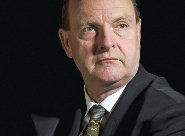 Paul O’Sullivan took over as head of security at South Africa’s airport authority in 2001, and discovered something was wrong from the start: why didn’t the policeman on duty want to take a statement about the attempted theft of his baggage? Since then, his life has been a series of bizarre events leading him ever deeper into the most complex criminal network of the post-apartheid era, including the recent the trial and conviction of former national police chief Jackie Selebi. But O’Sullivan’s determined quest to expose crookedness isn’t over yet, and he now has former president Thabo Mbeki in his sights. read more
Paul O’Sullivan took over as head of security at South Africa’s airport authority in 2001, and discovered something was wrong from the start: why didn’t the policeman on duty want to take a statement about the attempted theft of his baggage? Since then, his life has been a series of bizarre events leading him ever deeper into the most complex criminal network of the post-apartheid era, including the recent the trial and conviction of former national police chief Jackie Selebi. But O’Sullivan’s determined quest to expose crookedness isn’t over yet, and he now has former president Thabo Mbeki in his sights. read more
The apparatus of state will simply ignore the government
‘Inspector Gadget’ | Police Inspector Blog
Police across England were told by the responsible minister of the democratically elected government that they must not chase performance targets any longer. “I can also announce today that I am also scrapping the confidence target,” said the Home Secretary, Theresa May, “and the policing pledge with immediate effect”. But the ‘senior management team’ of the West Yorkshire Police have stated they will go on no matter what the government says. read more
Has Christian Democracy reached a dead end?
Jan-Werner Mueller | Guardian.co.uk
The commentator completes a brief survey of the struggles of Christian Democracy in Germany and Europe today. The French leader Georges Bidault claimed that Christian Democracy meant “to govern in the centre, and pursue, by the methods of the right, the policies of the left”. But Christian Democracy’s brief French moment in the 1950s didn’t survive the return of de Gaulle, and Christian Democratic parties on the continent today face an existential crisis. read more
Also: Monsignor Ignacio Barreiro’s talk at the Roman Forum’s 2010 Summer Symposium, entitled The Problem of Christian Democracy will be made available online in audio form sometime in the coming months.
Deep in Shanxi, the most Catholic village in China
Anthony E. Clark | Ignatius Insight
Church after church dot the landscape and high steeples rise above small villages as they do in southern France. Passing through a narrow side road one arrives and is welcomed by three great statues at the village entrance: St. Peter holding his keys is flanked by Saints Simon and Paul. Thirty minutes before Mass the village loudspeakers, once airing the revolutionary voice of Mao and Party slogans, now broadcasts the rosary. Welcome to Liuhecun, the most Catholic village in China. read more
Look for me in the Cotswolds.
Dino Marcantonio
The apologists for modernist architecture have tried for a century to gain public acceptance of and appreciation for their horrors. While the elites have almost overwhelmingly been converted, the general populace around the world still sees that the Emperor has no clothes, and almost always prefers architecture that reflects the tried and true, the local and the natural. Alain de Botton, the Swiss essayist, ‘pop philosopher’, and former ‘writer-in-residence’ at Heathrow Airport, is the latest to give it a go, this time in the pages of the modernist Architectural Record. Dino Marcantonio provides a most useful fisking. read more
Canada is a French country
Andrew Coyne | Maclean’s
At the recent Canada Day celebrations on Parliament Hill, Canadian PM Stephen Harper spoke of “the steadfast determination and continental ambition of our French pioneers, who were the first to call themselves ‘Canadians.’” At other times he has spoken of Canada as having been “born in French,” of French as “Canada’s first language,” and, most famously, of Quebec City as “Canada’s first city,” its founding in 1608 as marking “the founding of the Canadian state.” While the sentiment may seen anodyne, moreover, the implications are radical. read more
A School Chapel on Long Island
St. Anthony’s High School, South Huntington, L.I.
“I have a general disgust for Catholic architecture since the 1950s,” says Brother Gary Cregan, the Franciscan friar who is principal of St. Anthony’s High School in South Huntington. The friar was quoted by the once-great New York Times in a 2008 article on the new chapel built by the Catholic school on Long Island, recently featured on the NLM blog. The Franciscans, according to the Times, “believe that the new chapel, with its soaring 30-foot ceilings, will teach teenagers that they are ‘worshiping God, not each other.'” Many of the chapel’s furnishings were bargain finds on eBay including the confessionals, the pews, a 110-year-old stained-glass window, and a century-old statue of St. Anthony. A new bell for the chapel’s tower would’ve cost $20,000, but Brother Gary (or “Mr. Cregan” as the newspaper referred to him) found an old one for $4,000. (more…)
The Hottentots Holland Capped with Snow

Some World Cup watchers found it slightly incongruous that as they balked in the heat of the northern summer, spectators in the stadiums were bundled up for the cold. It does snow in South Africa, though not every year and usually much less the closer you are to the sea (or rather sea-level). This recent photo distributed by Die Burger shows the Hottentots Holland range, near my former neck of the woods, capped with snow.
Even on days when you can see the mountain peaks topped in white, the temperature closer to the ground still allows you to spend a care-free afternoon relaxing at a vineyard with friends.
Heraldic Discrepancies in Fashion
Ralph Lauren’s Modern Field Collection

THERE IS ATTENTION to detail and then there is pedantry, and I hope this falls into the former rather than the latter. Among the numerous e-mails which find their way into my electronic postbox are occasional notifications from the Polo Ralph Lauren corporation, a multi-faceted operation involved in the design, sale, and distribution of fairly decent items of clothing. Just one such e-mail received just the other day informed me of Ralph Lauren’s new ‘Modern Field Collection’, yet another judicious tie-in to take advantageous of the patriotic (or vicariously patriotic) impulses of the consumer before, during, and after the 2010 World Cup. As someone who is interested in national and cultural symbolism, most especially heraldry, I was mildly intrigued and clicked through to find a veritable gold mine of discrepancies which I hope the reader will forgive my exposition of. (more…)
Portugal in the 1950s
I felt as if I were going from a noisome prison out into the morning air in the countryside. … After the clangor and tension [of New York], and so many faces taut or ugly or vicious, life in Portugal might be unaffluent but it was still quiet, still kindly, still human. The lack of development and the poverty struck one as a blessing. The absense of advertisers and of mass media men and of vote-catching politicians, bawling out their meretricious wares, was like relief from the presence of the demented.
via R.J. Stove
Don Carlos and the Holy Alliance III
Among the many charms of the Peter Simple column which was written for so long by the late Michael Wharton were the numerous entities and institutions which existed by columnar fiat. Despite its luddism, the column had a space program, of which the columnar space vehicle, Don Carlos and the Holy Alliance III, was the pride and joy. Here are but two instances in which the operations of the vehicle were revealed.
A Celestial Snub
 The British space probe, Beagle 2, now insolently speeding towards Mars, carries a fragment of a pop song and some fatuous art work by Damien Hirst, equally vile symbols of degenerate popular culture. Is there a chance that it will encounter our own columnar space vehicle, Don Carlos and the Holy Alliance III, now motoring on a tour of the solar system?
The British space probe, Beagle 2, now insolently speeding towards Mars, carries a fragment of a pop song and some fatuous art work by Damien Hirst, equally vile symbols of degenerate popular culture. Is there a chance that it will encounter our own columnar space vehicle, Don Carlos and the Holy Alliance III, now motoring on a tour of the solar system?
If it does, our august machine, programmed to avoid the swarm of vulgar objects now buzzing tastelessly about the heavens, will give no sign of recognition other than a slight increase of freezing hauteur. It will leave Beagle 2 to its banausic task of probing and burrowing into the surface of the Red Planet in its futile search for microbes and soda water.
Then away to the remote depths of space, for a weekend in the realm of the satellites of Pluto, discovered by our space vehicle on a previous expedition. There, on those delightful little worlds, a hereditary caste of noblemen spend their leisure hunting, fishing and, in the evenings, in their commodious hunting lodges, discuss such questions as the possibility of life, improbably near the sun, on our own unimaginably distant earth.
Keep off!
Not content with scattering malodorous rubbish all over the solar system (our solar system, incidentally), American scientists have fired a missile at a defenceless comet just to see what it is made of.
Is there to be no end to this senseless rage of curiosity? If our columnar space vehicle, Don Carlos and the Holy Alliance III, should ever find itself motoring in the neighbourhood of one of these senseless acts of aggression, it has orders to take appropriate action, the exact nature of which will be quite a surprise.
Aldermania
Matt Alderman, already the subject of his own tag on this site, finally has a website of his own for Matthew Alderman Studios. You can investigate his prints, drawings, ecclesiastical furnishings, and liturgical objects. You can even ‘like’ it on Facebook.
À bas l’Académie anglaise!
Proponents of an Academy of English are guilty of leaps of logic
IT STANDS AS one of the great monuments of autonomy and decentralisation that ever existed — the English language. But this great monument is under threat from an unlikely source: one sworn to defend it. The Queen’s English Society has announced plans to form an “Academy of English” along the lines of the Académie française for French or the Real Academia Española for Spanish.
“People misunderstand things if language is not used correctly,” argues Rhea Williams of the Queen’s English Society. “Misuse of apostrophes is the best-known problem, but people also don’t seem to know about tenses any more, for example, you hear ‘we was’ a lot.”
“An academy is needed because the correct information is not something that people can find easily. I suspect that many people in this country have easier access to a computer than to a reference book. They will be able to search without embarrassment, although people should be unafraid to say that they do not know what a word means.”
“At the moment, anything goes,” says Martin Estinel, the founder of the new academy. “Let’s set down a clear standard of what is good, correct, proper English. Let’s have a body to sit in judgment.”
No less an authority than Gerald Warner of Craiggenmaddie has waded into the debate, asserting on his Telegraph blog that “all champions of literacy will wish the society success.”
The complaints raised have a great deal of justification behind them, but the establishment of an academy does absolutely nothing to solve them. Indeed, the very complaint that the misuse of English is rampant and on the rise correctly presupposes that we are already able to discern proper English from improper English.
Rhea Williams and her confrers assume that when a person says “we was”, he is also claiming that it is right and proper English for him to say so. But, on the contrary, if you heard someone on the bus say “we was” and then inquired “Is that proper English?” he would almost certainly, if perhaps sheepishly, admit that it is not.
Similarly we hear complaints about “text speak”, as the shorthand version of English used in text messages (also known as SMSs) is called. But text speak similarly makes no claims to being acceptable as proper English. None would dream of preparing a job application, for example, in text speak.
Furthermore, the Queen’s English Society does not even use proper English on its website.
The Society aims to start using its BLOG [sic] again, following a period of inactivity. If you have something to say about the English language, in the context of education, employment, the media and feel able to contribute to the debate, we invite selected guest bloggers to send in their blogs.
“Blog” is a contraction of “web log” which has rapidly achieved legitimacy, and refers to the entirety of a blog, but the QES almost certainly used the word “blog” instead of what they actually meant, “blog entries”.
The very word “blog” itself is a perfect example of the threat to English that establishing an academy poses. I dislike the word myself, but its usefulness is inescapable. We needn’t refer to that wide and varying array of websites which are in fact an agglomeration of personal writings and links to other items of note — we can simply say “blogs”. An English Academy, on the other hand, might have banished “blog” from its fatuous version of what constitutes proper English early on, in which case the language would be all the poorer, or at least all the more cumbersome.
English speakers know good use from poor use, and when they’re not sure they overwhelmingly defer to those who do know. An Academy of English would do more harm than good and would solve none of the problems that would provoke its foundation. A massive and broad-based information campaign, on the other hand, paired with the return of authoritative teaching in schools, would aid the better use of English infinitely more than a body of pedants to settle disputes that do not exist. Pressure must be exercised against broadcasters, who spread improper English through a misguided attempt at authenticity, and we must also challenge the widespread perception of a social bias against proper speaking.
All these things can be done without any academy, and indeed establishing one would take energy away from these efforts. I’m sure therefore that, pace Mr. Warner, all champions of literacy will join me in shouting “À bas l’Académie anglaise!”
Films Recently Watched
In reverse chronological order, from the most recently viewed backwards.
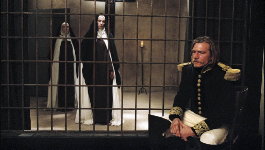
|
Ne touchez pas la hache (2007, France) — Based on Balzac’s La Duchesse de Langeais. I think we need more films set in Restoration France, but this one often fell flat. |
 |
Män som hatar kvinnor (2009, Sweden) — A journalist has six months to investigate the strange murder of a girl from the island estate of a prominent family. A very good mystery, though I had to fast-forward multiple times due to graphicness. Released in the U.S. as ‘The Girl With the Dragon Tattoo’ instead of ‘Men Who Hate Women’. |
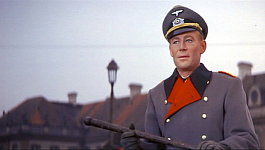
|
The Night of the Generals (1967, Great Britain-France) — A quality production depicting the quest of a German officer to obtain justice in arresting a sociopathic general for the murder of a Polish prostitute. Omar Sharif, Peter O’Toole, Philippe Noiret, Christopher Plummer, Charles Gray, and Tom Courtenay. |

|
Three Days of the Condor (1975, U.S.A.) — A literary analyst at a CIA front organisation returns to the office from lunch to find all his colleagues shot dead. Robert Redford and Max von Sydow. |

|
Le combat dans l’île (1962, France) — A right-wing extremist thinks he’s assassinated a prominent left-wing extremist but soon finds not all is as it appears. Romy Schneider plays the woman caught between the would-be murderer and his typographer friend. |

|
À bout de souffle (1960, France) — A rather lame romanticisation of a cop-murderer and his exploits from Jean-Luc Godard. Paris in the 1950s looks great though. |

|
Defence of the Realm (1985, Great Britain) — A newspaper exposes a Member of Parliament as a potential spy, but it turns out the story is much more complicated than first appearances would have it. Starring Gabriel Byrne, Ian Bannen, Greta Scacchi, Denholm Elliott, Bill Paterson, and Robbie Coltrane. |

|
A Few Days in September (2006, France) — An intriguing spy drama set in the days leading up to September 11th, a French spy (Juliette Binoche) is minding the grown children of an old ex-C.I.A. agent (Nick Nolte) pursued by a psychotic assasin (John Torturro). |
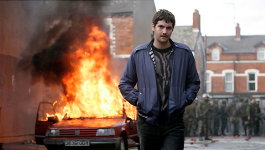
|
50 Dead Men Walking (2008, Great Britain-U.S.A.-Canada) — Based on the story of terrorist-turned-informer Martin McGartland, with Ben Kingsley playing his RUC handler. |

|
The Red Baron (2008, Germany) — A very light handling of an interesting historical character man. Everyone dresses well, but Joseph Fiennes as Billy Bishop, the Red Baron’s nemesis, is the least convincing fighter ace in history. |
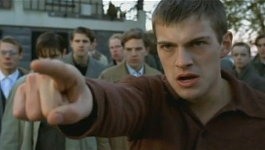
|
Ondskan (2003, Sweden) — A surprisingly good film in the boarding-school resistance-to-bullies category with a few twists, only slightly tinged by the socialism of the author of the novel on which it’s based. |

|
L’Heure d’été (2008, France) — Three siblings deal with their mother’s estate. |

|
Sink the Bismarck! (1960, Great Britain) — Cracking naval tale. A classic of the World War II genre. |

|
The Count of Monte Cristo (2002, U.S.A.) — Significant changes from the plot of the book besides the usual compression of the story line mar this film. Just not as worthwhile as the lavishly done 1998 French mini-series. |

|
On the Waterfront (1954, U.S.A.) — A priest tries to convince a mob lackey to testify against his bosses to challenge their murderous and abusive control of the waterfront. Particularly intriguing as the director was brave enough to challenge Hollywood communists in the 1950s. |

|
Paris (2008, France) — The interweaving lives of a handful of Parisians. I will see any film that has Juliette Binoche or Mélanie Laurent in it, and this film has both. Also with François Cluzet (of “Ne le dis à personne/Tell No One”) and Albert Dupontel. |
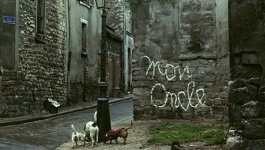
|
Mon Oncle (1958, France) — Jacques Tati’s first colour film, Monsieur Hulot continues to struggle with the postwar infatuation with modern architecture and consumerism. On its release it was condemned for its obviously reactionary world-view, but has since become a cult favourite. |
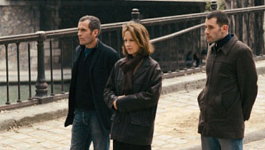
|
Le Petit Lieutenant (2005, France) — A young police recruit from the provinces joins a Parisian precinct and investigates a murder alongside his female unit commander, a recovering alcoholic. |

|
Les rivières pourpres (2000, France) — Jean Reno plays a police detective sent to a small university town in the Alps to investigate a brutal murder. Meanwhile, another detective (played by Vincent Kassel) looks into the desecration of the grave of a young girl. The plots soon become intertwined in an intriguing fashion. This film failed to live up to its potential (the university aspect could have been developed further) but is still a decent cop flick. |

|
Buongiorno, notte (2003, Italy) — The kidnapping of Aldo Moro by the Red Brigades. |
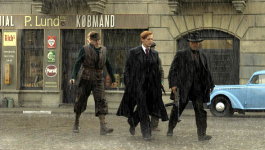
|
Flammen & Citronen (2008, Denmark) — Another good Scandinavian World-War-II resistance movie, alongside Norway’s “Max Manus” of the same year. (Previously covered here). Mads Mikkelsen (the Bond villain in “Casino Royale”) plays ‘Citronen’. |

|
Kontroll (2003, Hungary) — The ticket collectors of the Budapest Metro worry about a series of mysterious platform deaths. Varies between the comic, the thrilling, and the tiresome. |

|
L’homme du train (2002, France) — A man steps off a train planning to rob a bank, but strikes up a friendship with a retired poetry teacher. Jean Rochefort and Johnny Hallyday are a surprisingly good pairing. |

|
Advise and Consent (1962, U.S.A.) — The Senate must either approve or reject the President’s nomination for Secretary of State, but plots and intrigues are afoot. Otto Preminger does Washington, and does it well. |

|
The International (2009, U.S.A.-Germany-Great Britain) — A cracking conspiracy thriller staring Clive Owen as a stubborn Interpol investigator and Naomi Watts as a Manhattan Assistant D.A. Includes a fun shoot-out in the Guggenheim. |

|
Banlieue 13 (2004, France) — Parkour-heavy action film set in a Parisian crime ghetto of the near-future. |

|
Il divo (2008, Italy) — Biographical film of the seven-time Italian prime minister Giulio Andreotti. Toni Servillo’s portrayal of the main character, however, crosses the line into caricature. |
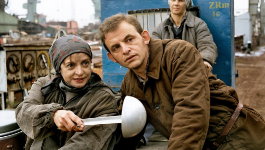
|
Strajk – Die Heldin von Danzig (2006, Germany-Poland) — A German film in Polish about the hardest-working employee at the Gdansk shipyards who finally takes a stand against the horrendous working conditions under the Communist regime. |
Hup Holland Hup
Laat de leeuw niet in z’n hempie staan
Hup Holland Hup
Trek het beestje geen pantoffels aan
Hup Holland Hup
Laat je uit het veld niet slaan
Want een leeuw op voetbalschoenen,
kan de hele wereld aan
Want een leeuw op voetbalschoenen,
kan de hele wereld aan.
Don’t let the lion stand in his undershirt
Go Holland Go
Don’t make the beast wear his slippers
Go Holland Go
Don’t get played off the field
Because a lion wearing football shoes
Can take on the whole word.
Because a lion wearing football shoes
Can take on the whole word.
Nature diary
by ‘REDSHANK’
ST JOHN’S DAY, Midsummer Day, has come and gone, bringing to the nature diarists’ community, as the country folk call us, melancholy thoughts of the inexpugnable passage of time and of the already declining year. In our neighbourhood, St John’s Eve is a time when age-old customs, elsewhere, alas, confined to the mists of antiquity, still flourish even in these prosaic days.
 Young men and maidens, not to speak of some in neither category, forsake their clubbing to dance in the woodland glades, undeterred by ghostly commercial travellers, doomed to play solo whist among the trees for all eternity, who scarcely interrupt their play to hurl traditional insults from another world.
Young men and maidens, not to speak of some in neither category, forsake their clubbing to dance in the woodland glades, undeterred by ghostly commercial travellers, doomed to play solo whist among the trees for all eternity, who scarcely interrupt their play to hurl traditional insults from another world.
It is different with the watercolourists who, following another ancient custom, come trooping out from the neighbouring town to set up their easels in the woods, industriously sketching everything they see, including the indignant dancers. Many of them are retired schoolteachers recommended “remedial art therapy” by their psychiatrists, distressed gentlefolk and ordinary people lately released into the community.
All take their orders from the big, ginger-haired old fellow who seems to be their leader. From my library window I watched through powerful field glasses as he rallied them amidst the dancers, lashing out with outsize paintbrush or sharp-edged paintbox and generally giving as good as they got.
He encouraged them, too, with anecdotes of eminent painters he seems to have known well: how he and Turner saw off a gang of criminal art dealers in Petworth Park; how he and Edward Lear, attacked by bandits while painting in Albania, put them to flight by endlessly repeating Lear’s limericks.
The village folk regard him with superstitious awe. He lives, so the talk goes in the Blacksmith’s Arms, in a rambling old mansion “way out t’ other side o’ Simpleham Great Park”. He is said to be a “gurt old ‘un for t’ book learnin’.” Some say he is writing a “Book of All Known Knowledge”. Some say he is the king of all nature diarists. All believe he is a powerful enchanter.
When I called at the inn the other day, there was an animated discussion about him, carried on, of course, in the genuine old British Composite Pandialect. Jack, the retired poacher told how, when laying a trail of sultanas to trap pheasants, he had seen the big man sitting in his enchanted garden, where creatures of the wild, deemed to be extinct in other parts of England, came to his call: the speckled linnet, the ringed dotterel, the corncrake and the wolf. Jack swore he had once seen an Andean condor perching on the enchanter’s shoulder and whispering secrets in his ear.
Old Seth the waspkeeper, who has a tendency to live in the past, and contributes a “Wasp at War” feature to the local newspaper, thinks the master watercolourist is a German or even Japanese spy, using watercolours to signal to enemy airmen. All believe he and his watercolourists are creatures of ill omen, and that to speak to them brings misfortune.
Though I am inclined to smile, I am sure there is a profound rural wisdom here, far beyond the grasp of your average know-all urban intellectual.
Nature diary
by ‘REDSHANK’
“SNOW in July, we’ll have sunshine forbye,” is an old adage still heard in the gunroom and four ale bar in our part of the country. Another old saying, “relevant”, as the country folk say, to the present unusual summer, is, “Nature diarists make their own weather”, already proved true a hundred times over.
As well as snow, we have had a freak sandstorm which deposited outsize date stones from North Africa on my croquet lawn; earth tremors which brought down a grandfather clock in the Chequers Inn on top of Old Frank, the landlord, causing much hilarity; and, to crown all, barn owls roosting together with a whole flock of magpies in Paxman’s Oak.
And – another sign of an unusual summer – when Old Seth the Waspkeeper, last of a dying breed, began his yearly “telling the wasps” according to immemorial custom, covering all the latest divorces, seductions, rapes, muggings and drug-peddling cases in the village, the cantankerous creatures would not listen, buzzing round in circles with a monotonous droning sound and giving every sign of cynical boredom.
Modern Scottish Architecture
Sydney Mitchell’s Royal Bank of Scotland, Kyle of Lochalsh
Among the surprisingly large pool of under-appreciated Scottish architects is Arthur George Sydney Mitchell. His Edinbornian works include Well Court in Dean Village, Ramsay Gardens in the Old Town, and his restoration of the Mercat Cross on the Royal Mile. Sydney Mitchell also did a number of branch commissions for the Commercial Bank of Scotland (which in 1959 merged with the National Bank to form the National Commercial Bank, which in turn merged into the Royal Bank of Scotland in 1979). (more…)
Interesting Things Elsewhere
Copernicus re-buried: an interesting but misleading story
Phil Lawler | catholicculture.org
 An interesting AP story is making the rounds this week, reporting that the Catholic Church has finally given due honors to Copernicus. Unfortunately the story is chock-full of statements that are severely misleading if not downright wrong. Start with the opening sentence… read more
An interesting AP story is making the rounds this week, reporting that the Catholic Church has finally given due honors to Copernicus. Unfortunately the story is chock-full of statements that are severely misleading if not downright wrong. Start with the opening sentence… read more
Britannia still rules the waves
Rian Malan | The Daily Telegraph
Natal was founded in the early 1840s by Sir Benjamin d’Urban on a stretch of elephant-infested bush. Some would say d’Urban stole the land from the Zulu kingdom, but the occupiers of record in 1843 were Boer Voortrekkers, who reloaded their ox wagons and headed back into the wild interior rather than submit to Queen Victoria. English-speaking Natalians heaved a sigh of relief and proceeded to turn their territory into a shrine to straight bats, and stiff upper lips. read more
Sarkozy’s arch rival Dominique de Villepin sets up rival party
conservativehome
 Dominique de Villepin, the eloquent opponent of the Iraq war and leader of the anti-Sarkozist centre-right in France, has set up a new political movement to bring the French right back to its sense. De Villepin used the launch to attack France’s involvement in the Afghan debacle, and Sarkozy’s decision to bring France back into the NATO military structure. ConservativeHome’s International section writes about the new movement with a sceptical eye. read more
Dominique de Villepin, the eloquent opponent of the Iraq war and leader of the anti-Sarkozist centre-right in France, has set up a new political movement to bring the French right back to its sense. De Villepin used the launch to attack France’s involvement in the Afghan debacle, and Sarkozy’s decision to bring France back into the NATO military structure. ConservativeHome’s International section writes about the new movement with a sceptical eye. read more
Amadeo Guillet
Obituary | The Daily Telegraph
 Daybreak on January 21, 1941: 250 horsemen erupted through the morning mist at Keru, cut through the 4/11th Sikhs, flanked the armoured cars of Skinner’s Horse and then galloped straight towards British brigade headquarters and the 25-pound artillery. At a distance of 25 yards they fired, cutting swathes through the galloping horses but also causing mayhem as the shells exploded amid the Sikhs and Skinner’s Horse. After a few more seconds the horsemen disappeared into the network of wadis that criss-crossed the Sudan-Eritrean lowlands. read more
Daybreak on January 21, 1941: 250 horsemen erupted through the morning mist at Keru, cut through the 4/11th Sikhs, flanked the armoured cars of Skinner’s Horse and then galloped straight towards British brigade headquarters and the 25-pound artillery. At a distance of 25 yards they fired, cutting swathes through the galloping horses but also causing mayhem as the shells exploded amid the Sikhs and Skinner’s Horse. After a few more seconds the horsemen disappeared into the network of wadis that criss-crossed the Sudan-Eritrean lowlands. read more
Are Czechs the least religious of all?
Dana Hamplová | guardian.co.uk
This claim is usually based on the sociological surveys and census data which show that only a small proportion of Czechs goes regularly to church and that most of the Czech Republic’s population does not report even a formal affiliation to any church. But the idea that Czechs are almost completely indifferent to any religion is not accurate. read more
Happy Dominion Day

fête du Dominion
à nos voisins du nord.
Dominion Day
to our neighbours to the north.
Rod Dreher is Profoundly Mistaken
Rod Dreher, a normally interesting commentator and incisive thinker, is profoundly mistaken in his response to the Pope’s handling of the Schönborn-Sodano spat, and betrays a fundamental misunderstanding of what’s gone on.
In April, Cardinal Schönborn, the Archbishop of Vienna, publicly and by name criticised Cardinal Sodano, the former Vatican Secretary of State, accusing him of having frustrated attempts to investigate abuse by clerics and further criticising his dismissal of some claims of abuse as “petty gossip”. These criticisms were largely seen as justified in their substance but were note-worthy as it is not customary for cardinals to attack one another publicly and by name.
The Pope then oversaw a meeting between Cardinal Schönborn and Cardinal Sodano (who, since 2006, is no longer Secretary of State) as an act of reconciliation. Alongside this meeting, a statement was released which included a gentle reminder that authority over the College of Cardinals is reserved to the Holy Father, and that likewise the supervision and criticism of cardinals is reserved to him, in consultation with others.
The reservation of this right to the Pope is both wise and justified. The basic idea is that cardinals are not to waste their time criticising one another, lest they, being human, be tempted into continual criticism which would interfere with and impede the work of their fellow cardinals.
The gentle reminder in this statement has, unfortunately, been blown completely out of proportion by the media. Rod Dreher has only augmented this with his commentary, but in doing so betrays a fundamental error that he made: his comments cite an Associated Press report of the supposed “unprecedented public rebuke”.
It is no surprise that Dreher found the AP report “both heartbreaking and infuriating”, as that is generally what AP reports related to the Church are designed to do. The Associated Press has fairly consistently and over a long period of time demonstrated their lack of reliability or journalistic credibility owing to their complete lack of understanding of how the Church operates and their undercurrent of antagonism to Christianity in general.
It is more “heartbreaking and infuriating” that a man as smart as Rod Dreher has had such a lapse of judgement as to allow the Associated Press to be the informer of his thoughts and guide of his heart. Dreher’s claim that Pope Benedict has “humiliated” Schönborn is complete nonsense, which is the result of Dreher’s unfortunate trust in the sham journalism of wire services. Dreher is also simplistic in his treatment of Cardinal Schönborn, who has been known to have gone a bit loopy of late, even to the extent of expressing reserved support for the ridiculous “apparitions” at Medjugorje, and even suggesting the Pope might visit the town some day.
The Archbishop of Vienna’s stringent stand against clerical abuse is nonetheless a most welcome counterpoint to the lackadaisical approach of the John Paul II-era curia. Small wonder the Pope spent the beginning of his pontificate making very wise replacements of questionable JP2 appointments, and continues to have a good eye for decent churchmen and for appropriate roles for them to exercise in the Vatican.
“This action by the pope is not a sign of strength,” writes Dreher, “but its opposite.” Does Dreher really think that allowing a cardinalatial free-for-all would be a sign of strength, while taking steps to remind cardinals of their obligations is a sign of weakness? Rather, Benedict has, as has been the mark of his pontificate, taken the route of gentleness and reconciliation while simultaneously stressing the need for order and unity.
Libeskind Strikes Again, in Dresden
The controversial starchitect exacts Poland’s revenge on a German city
THE WAR WAS NOT kind to Dresden: the bombers of the Royal Air Force and the U.S. Army Air Force rained destruction on the Saxon capital, reducing much of the city to piles of rubble, and killing thousands upon thousands of innocent women and children in the process. One of the few buildings to survive the cataclysmic and morally reprehensible bombing campaign was the old garrison, which after the war was turned into a military museum.
Poland, whose unprovoked invasion by the Nazis sparked the Second World War, is exacting a curious revenge on neighbouring Germany, however. Daniel Libeskind, the controversial Polish starchitect, is building a monstrous addition to the Dresden Military History Museum that may not be a crime against humanity, but is undoubtedly a crime against architecture. (more…)
Search
Instagram: @andcusack
Click here for my Instagram photos.Most Recent Posts
- Burns Tower April 19, 2024
- Patrick in Parliament March 18, 2024
- Articles of Note: 13 March 2024 March 13, 2024
- Cambridge March 9, 2024
- Taken on Trust March 4, 2024
Most Recent Comments
Book Wishlist
Monthly Archives
Categories


